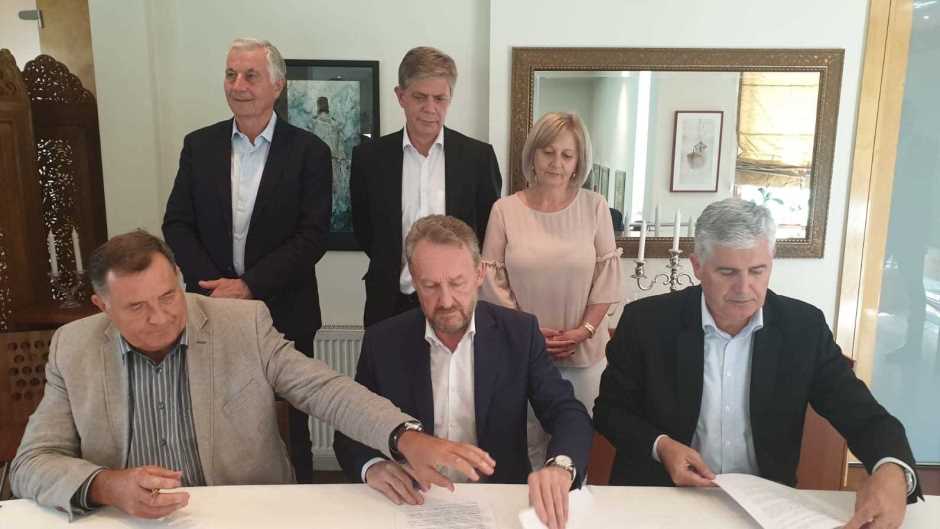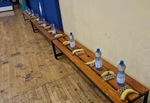
The leaders of the three national parties which won the October 2018 election have signed a set of principles on Monday according to which the state-level government will be formed within 30 days.
The Bosniak Party for Democratic Action (SDA), the Croat Democratic Union (HDZ) and the Serb Alliance of Independent Social Democrats (SNSD) could for months not agree on how to form the government - in Bosnia called the Council of Ministers - mainly due to bickering over the country’s NATO membership.
The Bosniak member of the tripartite Presidency said he refuses to greenlight the prime minister proposed by the Bosnian Serb member because the candidate is opposed to the country's membership in the alliance. Bosnia has previously pursued NATO membership but in recent years Bosnian Serb politicians have changed their minds.
Bosnia’s Croat ethnic parties have meanwhile been complaining about the election law in the country. The Croat member of Bosnia’s tripartite Presidency is left-leaning Zeljko Komsic and nationalist Croat parties, especially Bosnia’s Croat Democratic Union (HDZ), have been arguing that he is not a legitimate representative of their ethnic group since he was elected thanks to mainly Bosniak votes while most of the Bosnian Croats really voted for HDZ leader Dragan Covic.
“After nearly nine months, as part of the talks between the winners, the SNSD, the SDA and the HDZ reached an agreement on forming the Council of Ministers within 30 days,” SNSD leader and Serb member of the tripartite Presidency, Milorad Dodik, told reporters.
Dodik explained that the reason for the deadlock was the demand by the SDA to send the Annual National Programme (ANP) to NATO, a step toward the country becoming a member of the alliance.
Bosnia’s path toward EU membership remains an unquestionable commitment, he added.
“With a new Council of Ministers we get a new dynamic where we will work on Bosnia getting the candidate status for the EU,” Dodik said.
The signatories also agree that the international administrator who was installed after the 1992-95 war to ensure the peace agreement will be implemented has to be abolished, arguing that the country can not expect to become an EU member while having a foreign governor.
Monday’s agreement “should deblock the work of the House of Representatives and the House of Peoples and create a new perspective in the work of the institutions,” Dodik said.
The 12 principles the parties signed cover a wide set of issues which have been blocking Bosnia from functioning.
SDA’s Bakir Izetbegovic, HDZ’s Dragan Covic and SNSD’s Milorad Dodik agreed to respect the Dayton Peace Agreement and its 11 annexes, including the European Convention on Human Rights and Basic Freedoms, as well as to respect the sovereignty and territorial integrity of the country. This may refer to frequent calls for the division of the country along ethnic lines by leaders of the Bosnian Serbs and Croats.
They also agreed to continue Bosnia’s EU and other integration processes according to the Constitution and laws “by harmonising the stances and interests of all government levels in Bosnia and Herzegovina.”
As for NATO, the principles confirm “the commitment for advancing the relationship with NATO without predicting future decisions in relation to membership of Bosnia and Herzegovina.”
They also pledged to implement of all rulings by domestic and European courts regarding Bosnia’s Election Law which “ensure the constitutional and institutional equality of all constituent peoples and citizens and their legitimate representation in all of Bosnia’s territory” as well as ensuring the representation of all constituent peoples at all government levels.
Another principle was the adoption and implementation of measures which prevent and eliminate discrimination based on ethnic, religious, ideological or any other kind of affiliation and ensuring equality in employment, education and social and healthcare services.
The leaders agreed to intensively work on harmonising the domestic laws with EU regulations through the Coordination Mechanism so that the conditions for Bosnia to join the EU are met and to and to implement a set of socio-economic reforms in harmony with the Economic Reform Programme, as well as to accelerate the construction of the transport, energy and digital infrastructure.
Measures which ensure the sustainable return of displaced persons and improve the institutional and legislative framework, as well as capacities for strengthening the prevention and fight against corruption and organised crime, including money laundering and terrorism, will be intensified, the document said.
Bosnia’s leaders are according to the principles obliged to continue to build good neighbourly relations with Croatia, Serbia and Montenegro by solving open issues “according to the principle of reciprocity, mutual respect and respect for international law.”
The leaders called upon the Parliament to form a commission for naming the Council of Ministers and other bodies.
In case the Council of Ministers of Bosnia and Herzegovina is not named within 30 days, the agreement is not valid.
Dodik explained which parties will be given which ministries, saying his SNSD will have the Chairman seat - effectively the post of the prime minister - as well as the Ministry of Communications and Transport, the Ministry of Foreign Trade and Economic Relations and the Ministry of Displaced Persons and Refugees.
The HDZ will get the Finance Ministry, the Justice Ministry and the Ministry of Civil Affairs, he said.
As for the SDA, he said it will get the Foreign Affairs Ministry, the Security Ministry and the Defence Ministry.
Dodik stressed that the government will consist of three Serb, three Croat and three Bosniak ministers, as well as one minister from the so-called “others” group - those who belong to neither of the three main national groups.
He called the deadlock that deprived the country of a government “unnecessary,” but said that if everything that was signed is not met within 30 days, his Alliance of Independent Social Democrats (SNSD) will block the work of all institutions “and nobody will be able to help it, no European or any other kind of institution.”
Kakvo je tvoje mišljenje o ovome?
Učestvuj u diskusiji ili pročitaj komentare





 Srbija
Srbija
 Hrvatska
Hrvatska
 Slovenija
Slovenija



























































